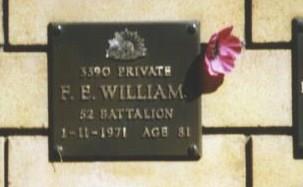WWI Stories – Frank Williams
Dr John Williamson shares the story of his uncle, Frank Ernest Williams.
Frank Williams was born in Southborough, Kent, United Kingdom. He moved to Australia, and became an Australian citizen while living in Chinchilla, Queensland. He married Ethel Marion Sturgess in 1913.
Following the outbreak of war, Frank enlisted to serve with the Australian Imperial Force in Brisbane on 5 October, 1916, with the 52nd Battalion. He embarked from Sydney on 14 June 1917, bidding farewell to Ethel and their first child. After arriving in Liverpool, England on 27 August 1917, he proceeded to Calais, France on 1 April, 1918.
On 27 April, 1918 during the battle at Villers Bretonneux, Frank sat up to help a mate and received a potentially fatal machine gun wound to the neck. The bullet emerged through his right right shoulder. He fell unconscious and was not expected to survive. Incredibly, the bullet missed several vital structures but partially shattered his larynx – again without causing a potentially fatal airway obstruction.
From the Casualty Clearing Station he was transferred to 1st Australian General Hospital at Rouen. On 2 May 1918, he was transferred to 1st Military Hospital Birmingham, England. There, he received multiple surgeries at the hands of then pioneer surgeons and anaesthetists. Inter-operative wound infections, in this pre-antibiotic era, were prevented by a drip can of saline suspended over his neck wound.
He emerged from hospital via the 3rd Auxiliary Hospital in Dartmouth on 29 August 1918, unfit for further military service and with a permanently hoarse voice. He returned to Australia on New Years Day 1919. He was discharged from the AIF on 27 January 1919.
Frank’s survival from such a wound was remarkable. He returned to live a long life in Queensland, taking up his pre-war trade as a plumber in Chinchilla. He and his wife had a second child, and the family later moved to Moorooka, Brisbane. He never spoke much about his war experience and was never heard complaining about his wounds.
Frank lived on with his hoarse (but readily understood) voice until the age of 81 years. He was cremated and his remains lie in the Pinnaroo Cemetery’s returned services personnel walls, at Bridgeman Downs, Queensland. About six months before he died he said to his nephew: “John, I’ve outlived every bloody doctor who said I couldn’t survive!”
Frank’s and Ethel’s second child went on to serve with distinction in the Royal Australian Navy during World War Two.








